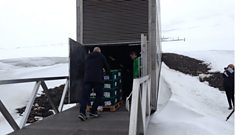GM plants; Svalbard Seed Vault; Directed Evolution; Dolphin Snot
GM in agriculture makes many people concerned. Adam poses many of the questions about the topic
The topic of GM plants raises strong opinions and many questions. This week, the Royal Society published answers to some of those questions. Adam speaks to Professor Ottoline Leyser, plant science expert and Head of the Sainsbury Lab in Cambridge. She was involved in writing the responses and Adam quizzes her on the possible issues with GM crops.
Institutes from around the world made deposits to the Svalbard Global Seed Vault this week. More than 8,000 varieties of crops from Germany, Thailand, New Zealand, and the World Vegetable Center arrived at the Vault, located on a remote Norwegian archipelago, to be stored deep within the permafrost. Reporter Marnie Chesterton was there to see it happen, and take a tour of this normally inaccessible place. The Vault is located within the Arctic Circle, and helps to protect the biodiversity of some of the world鈥檚 most important crops against climate change, war and natural disaster.
This week Professor Frances Arnold was awarded the Millennium Technology Prize; the Finnish version of the Nobel Prize. Her work is a process called Directed Evolution, and involves creating batches of mutant proteins to see if the mutations make them better at certain functions.
Dolphins use ultrasound to echolocate. Until recently, scientists did not quite know how. Making ultrasonic noises normally requires some hard surfaces such as metal, and dolphins don鈥檛 have metal in their blowholes. Acoustic scientists Aaron Thode at the Scripps Institute of Oceanography in San Diego thinks he鈥檚 solved this conundrum, and it involves snot.
Producer: Jen Whyntie
Last on
Clip
-
![]()
Storing the World鈥檚 Seeds in a Frozen Mountainside
Duration: 02:02
Broadcasts
- Thu 26 May 2016 16:30大象传媒 Radio 4
- Thu 26 May 2016 21:00大象传媒 Radio 4
Explore further with The Open University
Discover more fascinating science content with The Open University
Podcast
-
![]()
大象传媒 Inside Science
A weekly programme looking at the science that's changing our world.



